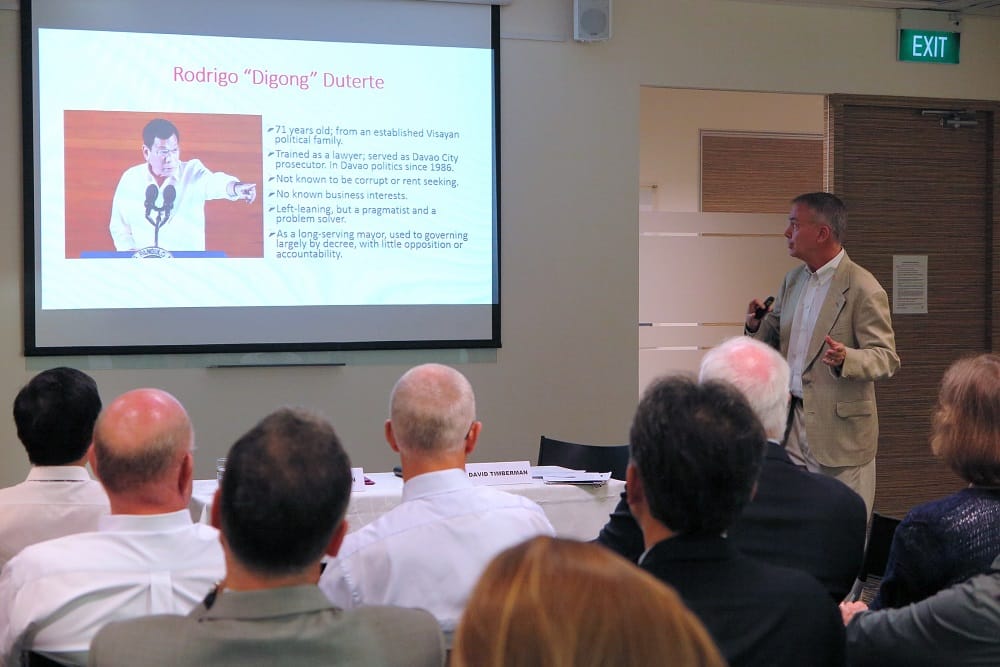Philippine President Rodrigo Duterte has made headlines since taking office – and has sparked a sudden interest in the Philippines. On Wednesday 23 November, we held an evening talk with Mr. David Timberman, Lee Kong Chian Research Fellow, National University of Singapore and Stanford University, examining the context of Mr. Duterte’s policy moves and the implications for both the Philippines and the wider Asian region. Mr. Timberman is a veteran observer of the Philippines and is currently working on two books about politics and governance in the country. The session was moderated by SIIA Director of Policy Programmes Chen Chen Lee.

Event Synopsis:
Since taking office in June on the back of a convincing election win, Philippine President Rodrigo Duterte has made waves. Extra-judicial killings associated with his war on drugs have been met with concern from the UN, foreign governments and human rights organizations. He has declared a “separation” from the United States and has sought closer ties with China. What do Mr. Duterte’s emerging policies mean for the Philippine economy, for political stability and for democratic governance? And what are the wider implications for Southeast Asia? This evening talk at the Singapore Institute of International Affairs will discuss the road ahead for the Philippines and Asia, with perspectives from Mr. David Timberman, a veteran observer of Philippine politics.
- Is Duterte circumventing democratic institutions and how are different groups in the Philippines responding?
- What can we expect from the Philippine economy under the Duterte Administration?
- What role does Duterte’s foreign policy have on the region’s relationship with China and USA?
Making Sense of the Duterte Administration
Mr. Duterte has been portrayed as a strongman by some journalists, but how stable is the Duterte administration?
“This government is an incoherent cobbling-together of a left-right coalition,” said Mr. Timberman, pointing out that the current administration includes both socialists and business leaders. It is not certain whether this will be able to hold together. There may be tensions between those who want to focus on investment and economic growth, and those who want more income redistribution and promotion of labour rights.
The Philippines, United States and China
On the international front, Mr. Timberman noted that Mr. Duterte’s foreign policy moves thus far are “not just a rejection of the United States…Duterte and his administration are rejecting Western or international norms and institutions”.
Mr. Duterte’s anti-Americanism may have traction with some segment of the Philippine population, perhaps those who felt President Benigno Aquino swung too far in favour of the US. But most people in the Philippines likely still have a favourable view of the United States – meaning that Mr. Duterte is departing from public opinion in this respect.
At the same time, it does make sense for the Philippines to seek closer ties with China. The Philippines has been behind the curve in forging economic links with China compared to many of its neighbours in ASEAN. It is logical for the Philippines to diversify its funding base. However, the Philippines government does have issues with absorptive capacity. An influx of Chinese funding to the Philippines runs the risk of inadvertently worsening corruption in the country.
Economic Growth
The Philippines recently released its official growth figures for Q3 2016 – the past three months since Mr. Duterte took office. The Philippines economy expanded 7.1 per cent on-year in July-September, making it the fastest growing economy in Asia. But Mr. Timberman noted that the figures aren’t necessarily attributable to Mr. Duterte, as this is still momentum carried over from the Aquino administration.
The Philippines economy is heavily based on remittances, which means that it regularly posts fairly steady 4 to 5 per cent growth regardless of the economic climate, and opportunities for foreign investors may remain limited even in the future. That said, the Philippines is also fairly well insulated from global shocks, so any significant disruption to the Philippine economy is only likely to come from within.
The Road Ahead
Opposition to Mr. Duterte’s government has not yet coalesced, and it remains to be seen what the pushback on some of his policies will be. Domestically, Mr. Duterte’s administration is embarking on several moves that bear watching, such as tax reform, removing constitutional restrictions on foreign investment, as well as potentially splitting the Philippines up into a federal system of states.
The implications of a pro-China and anti-US policy for the Philippines are also not clear, especially since it is not yet known how US President-elect Donald Trump will manage his own policy towards China and Asia – Mr. Trump’s election win injects further uncertainty into the regional situation.
Event Details
Date: Wednesday, 23 November 2016
Time: 5:30pm – 7:00pm
Venue: Singapore Institute of International Affairs
60A Orchard Road #04-03 (Level 4M) Tower 1,
The Atrium @Orchard, International Involvement Hub,
Singapore 238890
About the Speaker:
David Timberman is a political analyst and development practitioner with 30 years of experience analyzing and addressing political and governance challenges, principally in Southeast and South Asia. Currently he is the NUS-Stanford University Lee Kong Chian Fellow on Contemporary Southeast Asia, which is enabling him to work on two books on politics and governance in the Philippines. During 2015-2016 he was a Visiting Professor of Political Science at De La Salle University in Manila. He has lived and worked in the Philippines, Indonesia and Singapore, including experiencing first-hand the democratic transitions in the Philippines (1986-1988) and Indonesia (1998-2001). He has written extensively on political and governance issues in the Philippines and has edited or co-edited multi-author volumes on the Philippines, Cambodia and economic policy reform in Southeast Asia. He holds a MA in International Affairs from Columbia University and a BA in political science (with honors) and history from Tufts University.




